Who were Samuel's sons, and how did their actions reshape Israel's history? Discover the profound impact of their leadership.
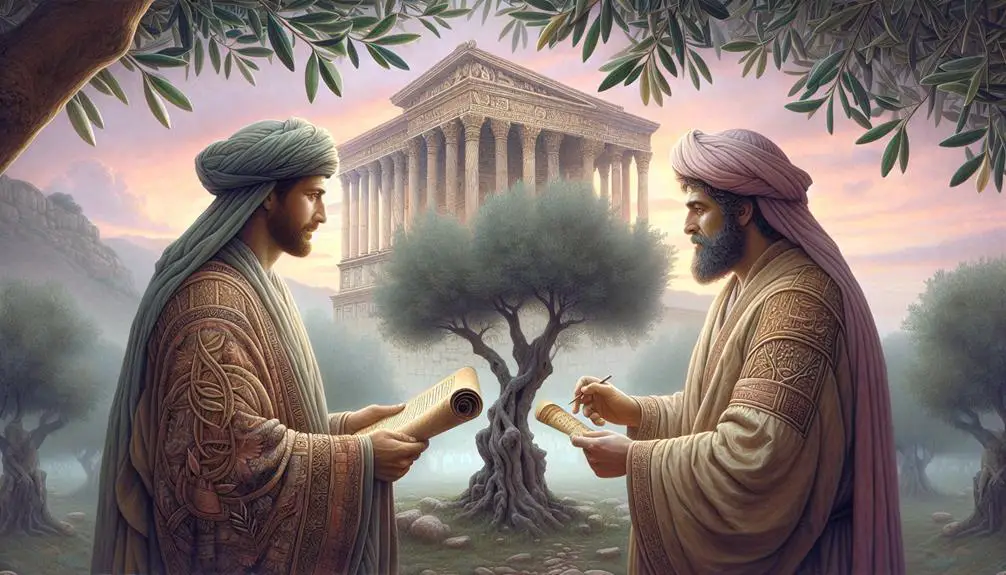
Sons of Samuel in the Bible
You might think the story of Samuel's sons in the Bible is just another ancient narrative with little relevance today, but it's actually a compelling exploration of leadership and morality that resonates with modern challenges.
Samuel, Israel's last judge, had sons who failed to live up to his legacy, their corruption and misjudgment fueling the Israelites' demand for a king and marking a pivotal transition to monarchy. This historical turning point offers invaluable lessons on the complexities of leadership and the consequences of moral failings.
Unpacking their story, you'll find insights that are as pertinent now as they were centuries ago.
Key Takeaways
- Samuel's sons engaged in corruption, undermining judicial integrity and societal trust.
- Their unethical behavior contributed to Israel's demand for a monarchial transition.
- The failures of Samuel's sons exemplify the importance of moral leadership.
- Their actions had lasting impacts on Israel's cultural and spiritual identity.
Samuel: Israel's Last Judge
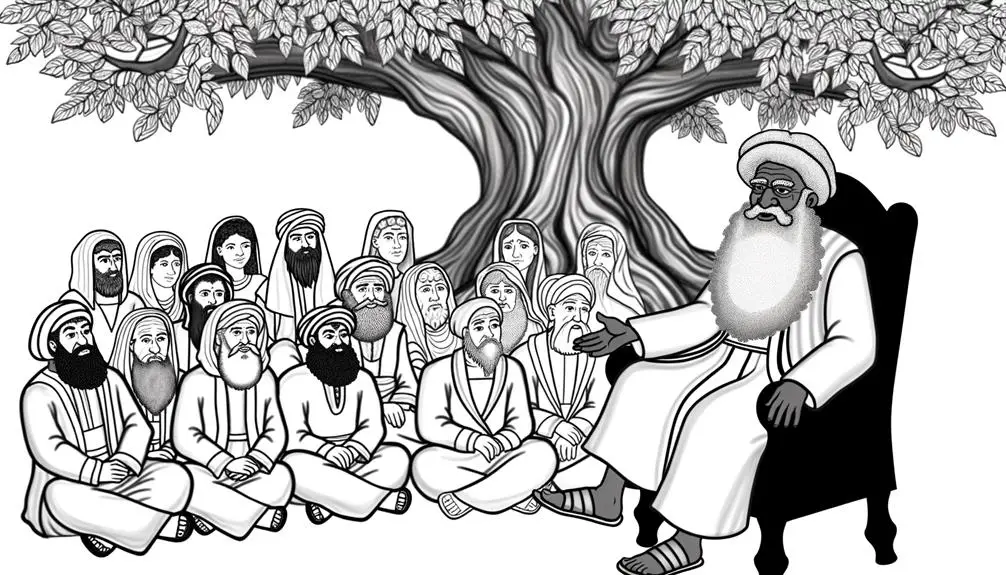
Samuel stands out as Israel's last judge, marking a pivotal transition from the era of judges to the establishment of monarchy, a transformation that reshaped the nation's political and spiritual landscape. Within this period of significant change, Samuel's prophetic role and spiritual guidance were instrumental. You'll find his contributions to Israel's history are far-reaching, deeply influencing the socio-religious fabric of the society.
As a prophet, Samuel's communication with God provided the Israelites with divine insight, setting a precedent for spiritual leadership. His guidance wasn't merely about relaying messages from God; it was about steering the nation through turbulent times. His role as a spiritual leader was multifaceted, encompassing judge, prophet, and counselor. This unique position allowed him to bridge the gap between divine will and the people's needs, ensuring the nation remained aligned with God's purposes.
Samuel's spiritual guidance was particularly crucial as Israel transitioned to monarchy. He didn't just facilitate this shift; he provided the moral and religious framework within which it occurred. His anointing of Saul, and later David, as kings wasn't merely a political act but a deeply spiritual one, signifying God's choice and blessing. This act underscored the importance of divine approval in leadership, a principle that would shape Israelite monarchy and its perception by the people.
In essence, Samuel's legacy as Israel's last judge isn't just a historical footnote. It's a testament to the profound impact of prophetic leadership and spiritual guidance on a nation's identity and destiny. Through his actions, Samuel laid the groundwork for a new era in Israel's history, one that would forever alter its course.
The Legacy of Samuel's Sons
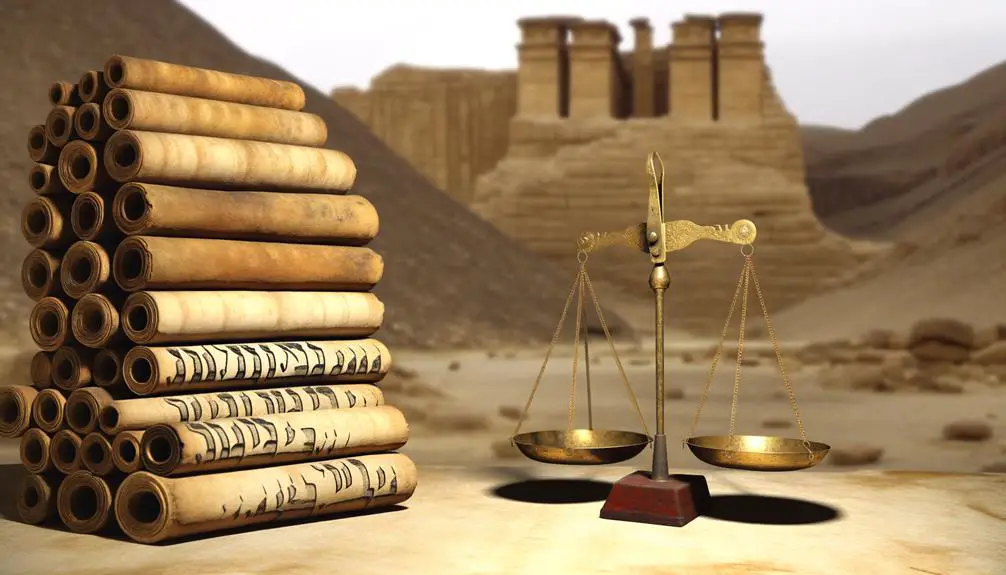
You'll find that the legacy of Samuel's sons is marked by their leadership failures, deeply impacting Israel's socio-political landscape. Their inability to emulate their father's integrity led to significant disillusionment among the Israelites, prompting a pivotal shift towards monarchal rule.
Samuel's response to his sons' actions not only reflects his personal disappointment but also underscores the broader implications for Israelite governance and spiritual life.
Their Leadership Failures
Despite their father's revered status, Samuel's sons failed to uphold his legacy, exhibiting leadership failures that starkly contrasted with their father's righteous governance. The erosion of ethical standards in their leadership highlights the complex dynamics of parental influence.
While Samuel was a paragon of virtue and justice, his sons strayed markedly from these principles. This divergence underscores a critical analysis of ethical erosion, where the virtues of the parent don't necessarily transfer to the offspring.
Their governance was marred by corruption and a blatant disregard for the judicial processes their father had esteemed. This scenario presents a poignant examination of leadership failures, emphasizing that the moral and ethical fiber of a leader isn't inherently passed down through lineage, but must be consciously cultivated and maintained.
Impact on Israel
The leadership shortcomings of Samuel's sons had profound repercussions on the socio-political fabric of Israel, catalyzing a shift towards monarchical governance.
Aspect |
Before |
After |
|---|---|---|
Governance |
Tribal Confederacy |
Centralized Monarchy |
Divine Guidance |
Direct through Prophets |
Mediated by Kings |
Prophetic Influence |
Integral to Leadership |
Diminished in Politics |
Social Cohesion |
Fragmented |
Consolidated under a King |
This transition marked a pivotal moment in Israel's history, as divine guidance and prophetic influence, once direct and unmediated, began to wane in the political sphere. The people's demand for a king, driven by dissatisfaction with Samuel's sons, fundamentally altered their relationship with divine leadership, setting the stage for both the unification and future challenges of the nation.
Samuel's Response
Samuel's recognition of his sons' leadership failures prompted him to address Israel's demand for a centralized monarchy, a decision that significantly shaped the nation's future governance and religious practices. You'll see, Samuel's response wasn't just about the immediate need for leadership but also about setting a course that would influence Israel for generations.
- Prophetic guidance: Samuel's actions underscore the importance of divine direction in leadership transitions, emphasizing a reliance on spiritual discernment over familial lineage.
- Centralized Monarchy: His pivotal decision paved the way for the establishment of kingship in Israel, fundamentally altering the political landscape.
- Parental legacy: Despite personal shortcomings in his children, Samuel's legacy was defined by his commitment to God's will, illustrating the complex interplay between personal failures and divine purpose.
Corruption and Misjudgment

You'll find that Samuel's sons, in their roles as judges, engaged in practices that starkly contrasted with their father's integrity, leading to significant ramifications for Israel.
Their abuses of power and neglect of duties not only eroded trust in judicial authority but also precipitated a crisis of leadership within the nation.
This analysis will explore how their actions contributed to a broader context of corruption and misjudgment, impacting Israel's socio-political landscape.
Sons' Abuses of Power
In analyzing the biblical narrative, it becomes evident that Samuel's sons, Joel and Abijah, egregiously exploited their judicial positions for personal gain, diverging sharply from their father's righteous path. Their actions illustrate a profound departure from ethical practices, particularly in the realms of judicial bribery and ethical oversight. These transgressions not only undermined the judicial system but also eroded the societal trust in leadership.
- Judicial bribery: They accepted bribes to pervert justice, favoring the wealthy and influential while neglecting the pleas of the less fortunate.
- Ethical oversight: Exhibited a lack of moral integrity that was expected of their positions, setting a negative precedent for future leaders.
- Exploitation for personal gain: Their actions were driven by greed rather than the welfare of the people they were meant to serve.
Neglecting Their Duties
Beyond their egregious engagement in judicial bribery and ethical lapses, Joel and Abijah further compromised their integrity by neglecting their duties, an act steeped in corruption and misjudgment. This disregard showcases a profound deviation from the ethical teachings traditionally expected of leaders in their society.
You'd think that under Samuel's watch, with his reputed wisdom and adherence to divine laws, his sons would embody the pinnacle of moral conduct. However, the absence of stringent parental guidance in their formative years likely contributed to their ethical decline.
Their failure to execute their responsibilities not only mirrors a personal moral bankruptcy but also reflects a systemic issue where the virtues of accountability and integrity were overshadowed by personal gain and negligence. This scenario underscores the critical role of parental guidance and ethical teachings in shaping leaders' characters.
Impact on Israel
Joel and Abijah's failure to uphold just leadership reverberated through Israel, exacerbating corruption and poor judgment within its governance structures. Their neglect highlighted a stark departure from divine guidance, setting a precedent for future leaders that compromised the nation's integrity and moral compass.
- The erosion of judicial fairness, as bribes and personal gain overshadowed the pursuit of justice.
- A growing disconnect between the leaders and the populace, eroding trust and fostering societal divisions.
- Cultural shifts that devalued the importance of divine guidance in decision-making, paving the way for secular influences to dominate.
These factors collectively undermined Israel's foundational principles, illustrating how leadership void of ethical and moral considerations can precipitate widespread corruption and misjudgment, with long-lasting impacts on a nation's cultural and spiritual identity.
The Demand for a King
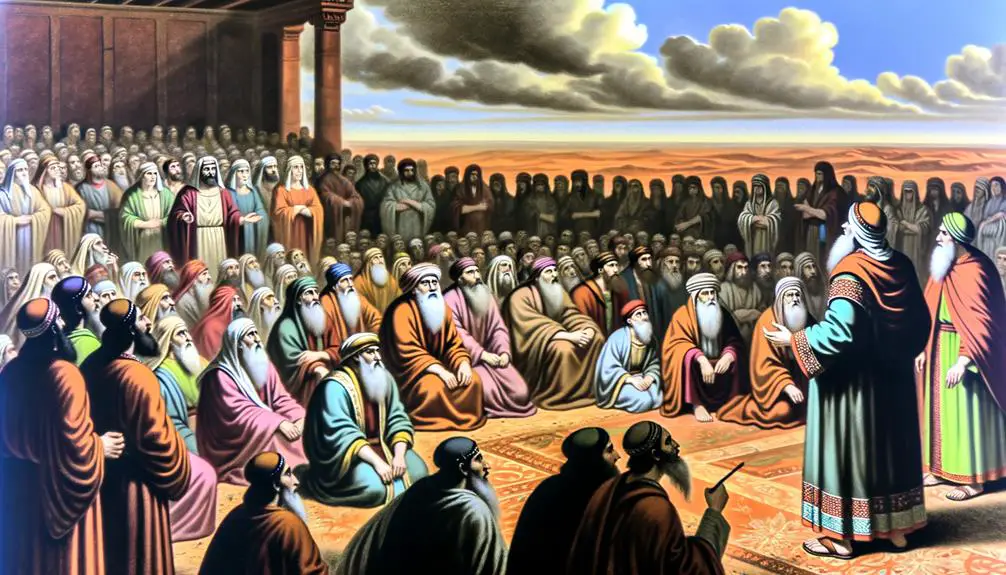
Despite Samuel's faithful leadership, the Israelites demanded a king to govern them, reflecting a pivotal shift in their societal structure and governance. This demand was not merely a rejection of Samuel's judgeship but a desire to align with the political structures of neighboring nations. They sought a leader whose charisma could unite and lead them in battles and governance, believing that a monarchical system would provide the stability and leadership necessary for their prosperity.
The call for a king, however, was fraught with public dissent. Concerns were raised about the potential for abuse of power and the loss of their unique identity as God's chosen people. Despite these apprehensions, the demand for a monarchy underscored a critical moment of transition, highlighting a deep-seated need for change in the face of external threats and internal disunity.
Aspect of Demand |
Implication |
|---|---|
King's charisma |
The Israelites associated charismatic leadership with military success and national unity. |
Public dissent |
Reflects the societal divide and concern over moving away from theocratic governance. |
Comparison with neighbors |
Indicates a desire to conform to the prevailing political structures in the region. |
Fear of instability |
Suggests that the demand for a king was also driven by a desire for political and social stability. |
This demand for a king represents a fundamental shift in Israelite society, one that would shape their identity and governance for generations. It underscored the complex interplay between divine guidance, societal expectations, and the inherent challenges of governance.
Transition to Monarchy
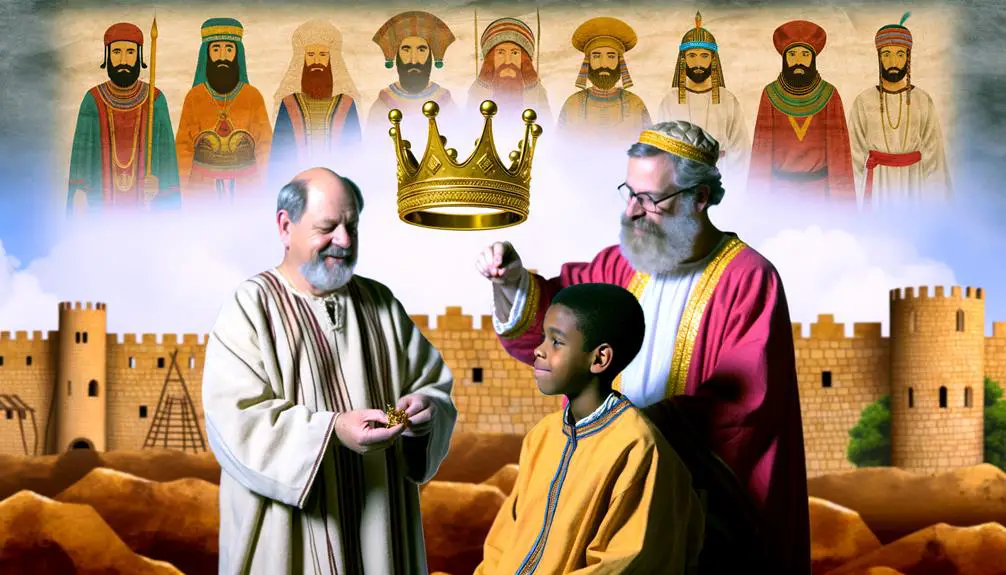
The transition to monarchy in ancient Israel marked a significant evolution in their political landscape, reflecting both the fulfillment of societal aspirations and the complexities of adopting a new form of governance. This period wasn't just a simple shift from judges to kings; it encapsulated a profound transformation in how power and authority were conceptualized and exercised.
You'll find that the royal anticipation felt by the Israelites wasn't merely about having a ruler but was intertwined with their desire for national unity and stronger defense mechanisms against external threats. The judicial transition, from the decentralized leadership of judges to a central monarchy, heralded a new era of governance that promised efficiency but also posed risks of tyranny and the loss of tribal autonomy.
To paint a clearer picture:
- Royal Anticipation: The collective yearning for a monarch wasn't just driven by the desire for political innovation but was deeply rooted in the need to emulate surrounding nations and consolidate a fragmented society under a singular, divinely anointed leadership.
- Judicial Transition: Moving from a judge-led system to a monarchy meant redefining justice and authority. This shift required careful navigation to balance the traditional values with the centralization of power.
- Societal Aspirations vs. Realities: The transition also highlighted a tension between the idealistic expectations of a monarchy and the practical challenges it brought, such as the potential for abuse of power and the need for checks and balances.
This phase of transition was a pivotal moment that shaped the trajectory of Israelite society, governance, and moral values, laying the groundwork for the complex dynamics of biblical leadership and kingship.
Lessons From Their Failures
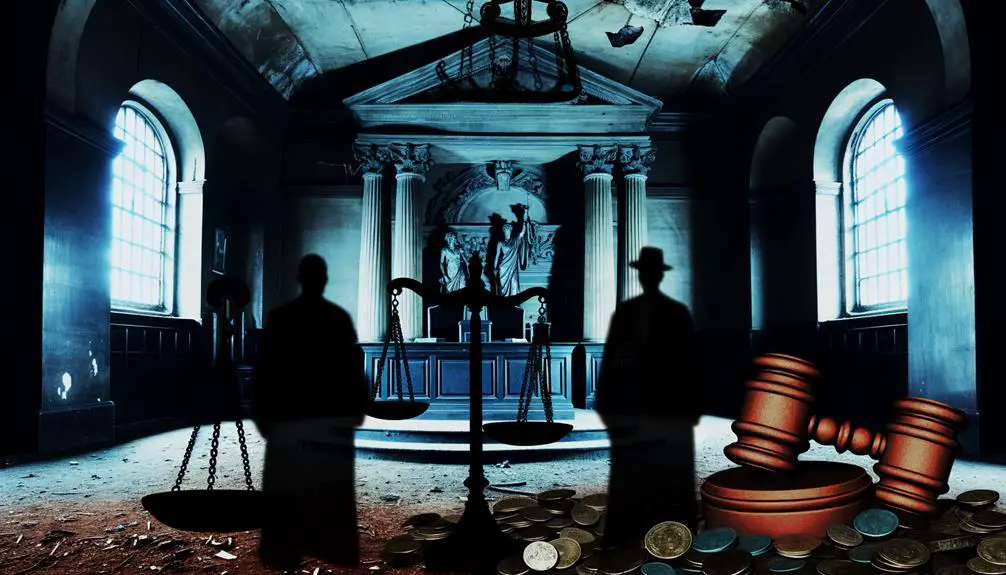
Reflecting on the shift towards monarchy in ancient Israel, it's crucial to understand the lessons learned from their failures, emphasizing the impact of these shortcomings on subsequent generations and their governance. The narrative surrounding Samuel's sons serves as a poignant example, where the absence of effective parental guidance and a clear spiritual decline set a precedent for the challenges the Israelites faced under new leadership structures.
You can glean from their story that the erosion of moral and spiritual values can lead to systemic failures within governance. Samuel's sons, appointed as judges, strayed from their father's righteous path, engaging in corrupt practices. This deviation underscores the vital role of parental guidance in shaping the character and principles of future leaders. Their actions not only tarnished their personal reputations but also eroded the public's trust in their leadership, contributing to the clamor for a monarchical system.
Moreover, their spiritual decline serves as a critical reminder of the importance of maintaining personal integrity and faithfulness to moral and spiritual commitments. When leaders fail to embody the values they're supposed to uphold, it can precipitate a broader societal shift towards moral ambiguity and ethical compromise.
In analyzing their failures, it's evident that the lack of strong parental guidance and a pronounced spiritual decline can have far-reaching consequences, affecting not only the immediate context but also setting a problematic trajectory for governance and leadership. These lessons underscore the necessity of cultivating leaders who are both morally and spiritually equipped to guide their communities towards prosperity and righteousness.
Reflections on Leadership and Morality

In exploring leadership and morality, it's crucial to recognize that every decision made by those in power not only shapes the immediate environment but also sets a precedent for future generations. The narrative of the sons of Samuel in the Bible encapsulates this truth, presenting a vivid tableau of ethical dilemmas and the importance of personal integrity in leadership roles.
Your reflection on their story underscores several key insights:
- Ethical dilemmas often place leaders at a crossroads, challenging them to balance personal gain against the welfare of their followers.
- Personal integrity acts as the bedrock of trust and respect in any leadership position, influencing the leader's ability to effectively guide others.
- The consequences of moral failings in leadership can ripple through generations, underscoring the long-term impact of decisions made in moments of compromise.
These points serve as a reminder that leadership isn't merely a position of power but a mantle of responsibility. Leaders are tasked with navigating complex ethical landscapes, making decisions that align with moral principles even when faced with personal loss or challenge. The story of Samuel's sons teaches you that succumbing to corruption and neglecting the needs of those you lead can erode the very foundation of your authority and legacy.
In contrast, upholding personal integrity in the face of ethical dilemmas not only fortifies your leadership but also cultivates a legacy of moral fortitude for future generations to emulate.
Frequently Asked Questions
How Did Samuel's Upbringing and Relationship With Eli the Priest Influence His Views on Parenting and Leadership, Especially in Contrast to the Way He Raised His Own Sons?
You're exploring how a mentor's guidance shapes leadership and parenting ideals. Samuel, under Eli's priestly influence, likely harbored high parental expectations.
Yet, his own approach diverged, possibly due to the burden of leadership or gaps in his upbringing. This contrast suggests that while mentorship can mold one's values, personal experiences and challenges ultimately refine them, leading to nuanced decisions in parenting and leadership that may not always align with one's initial influences.
Are There Any Historical or Archaeological Findings That Provide Additional Insights Into the Lives and Times of Samuel's Sons Beyond the Biblical Narrative?
You're exploring whether archaeological methodologies or coinage evidence can shed light on figures from ancient history. While these approaches have unearthed insights into cultures and key figures, applying them to Samuel's sons is challenging.
The biblical narrative doesn't provide specific details that could guide such investigations. Without concrete archaeological or numismatic data linked to them, it's difficult to expand our understanding of their lives and times beyond what's recorded in scriptures.
How Do Various Jewish, Christian, and Islamic Traditions Interpret and Teach the Story of Samuel's Sons Differently, Especially Regarding Their Roles and Impact on the Transition to Monarchy in Israel?
You'll find that cultural interpretations greatly influence how Samuel's sons are seen within Jewish, Christian, and Islamic traditions. These teachings delve into their roles and impacts on Israel's shift to monarchy, focusing particularly on leadership ethics. Each tradition offers a unique lens, analyzing their actions and decisions critically.
This diversity in interpretation provides a rich, multifaceted understanding of their historical and moral significance in the transition period.
In Light of Samuel's Sons' Actions, What Discussions Exist Around the Nature of Nepotism and Its Consequences in Ancient Israelite Society and Governance?
When exploring nepotism and its fallout, you'll find discussions that highlight how parental legacy and leadership failure intertwine. These debates scrutinize the consequences of favoring family ties over merit, particularly in governance.
Analysts argue that such practices can erode trust and efficiency, drawing parallels with ancient societies. The focus is on understanding the broader implications of nepotism, beyond individual cases, to grasp its lasting impact on societal structures and fairness.
Considering the Broader Biblical Context, How Have Samuel's Sons Been Referenced or Alluded to in Later Biblical Texts or by Prophetic Figures, and What Significance Do These References Carry?
You're diving into how figures later in the Bible reference or allude to earlier narratives, exploring prophetic symbolism and ethical parallels. These mentions aren't just callbacks; they're rich with meaning, serving as lessons or warnings.
They embody the complexity of human behavior and divine expectations, illustrating how past actions resonate through time. Analyzing these references, you uncover layers of interpretation that deepen your understanding of biblical teachings and their enduring relevance.
Conclusion
In examining the narrative of Samuel's sons, you've navigated the tumultuous waters of corruption, misjudgment, and the consequential shift from judges to kings. Their failures illuminate the peril of leadership devoid of integrity and the criticality of moral compass in governance.
This story serves as a dual reflection: a caution against the erosion of ethical standards and an affirmation of the need for righteous leadership. Through their downfalls, you discern the timeless lesson that virtue and vigilance are paramount in sustaining just rule.



Sign up